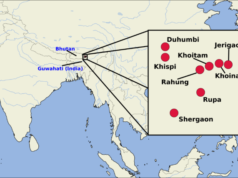From an evolutionary perspective, conditional mating strategies helped our ancestors maximize their reproductive success. Credit: © Keoni Cabral / Flickr
Our romantic choices are not just based on feelings and emotions, but how rich we feel compared to others, a new study published in Frontiers in Psychology has found.
“We wanted a better understanding of the psychological importance of money in the development of romantic relationships because very little is known about this subject. That way people would have a better perspective of the relationships they are in,” explained Professor Darius Chan from the Department of Psychology, at the University of Hong Kong.
Two experiments were performed on groups of Chinese college students already involved in heterosexual long term relationships. The couples were made to think they were either wealthy or poor to examine their mating behavior.
In the first study they found the wealthy men were less satisfied with their current partners’ physical attractiveness and were more interested in short-term relationships than those who were made to feel that they had less money. However, women who felt wealthy did not make higher demands regarding the men’s physical appearance.
All of the wealthy participants in the second study found it easier to interact with an attractive member of the opposite sex than those belonging to a financially disadvantaged class. Interestingly and as expected, more men than women from both wealthy and poor conditions selected a closer seat to the more attractive people.
Find your dream job in the space industry. Check our Space Job Board »
“We remarked that wealthy men attach more importance to a mate’s physical attractiveness setting higher standards and preferring to engage in short-term mating than those who have less money. However, for committed women, money may lead to less variation in their mating strategies because losing a long-term relationship generally has a higher reproductive cost,” explained Chan.
From an evolutionary perspective, conditional mating strategies helped our ancestors maximize their reproductive success.
However, by looking at how people reacted when they thought themselves to be wealthy or poor supports the evolutionary psychology hypothesis that individuals adopt conditional mating strategies in response to environmental conditions such as money possession.
Even though the study was applied to a specific culture, these psychological mechanisms still play important roles in human mating. “Whereas it remains as an empirical question to be answered, we expect that our findings are likely to be found in other cultures as well, because the basic mechanisms of mate selection have been found to be rather similar across culture,” Chan said.
Source: Frontiers
Journal Reference:
- Yi Ming Li, Jian Li, Darius K.-S. Chan, Bo Zhang. When Love Meets Money: Priming the Possession of Money Influences Mating Strategies. Frontiers in Psychology, 2016; 7 DOI:10.3389/fpsyg.2016.00387











